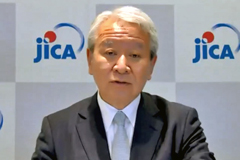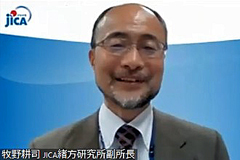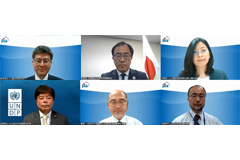“Human Security Today” Report Launch: Revisiting Human Security Amid the Current Chain of Global Crises
2022.07.04
JICA Ogata Sadako Research Institute for Peace and Development (JICA Ogata Research Institute) launched the first issue of its regular flagship report “Human Security Today” in Japanese in March 2022. The Institute is preparing the English version of the report.
On April 26, 2022, a symposium to celebrate this was held online as the second webinar of a human security webinar series co-hosted by the United Nations Development Programme (UNDP) and JICA Ogata Research Institute.
The symposium opened with remarks from Tanaka Akihiko, president of JICA, noting that human security is needed more than ever now as various threats are emerging, linked to one another. JICA has been continuously active with a mission to achieve human security and released “Human Security 2.0” (human security for a new era) in 2019 to address new challenges that reflect current realities. Tanaka expressed his anticipation to see JICA spreading the contemporary significance of human security globally and facilitating discussion and implementation through this new report.
Next, Makino Koji, director general of JICA Ogata Research Institute, who authored the chapter “Human Security Today and New Development Cooperation,” spoke. Makino explained the definition of “human security,” saying that although human security can be a vague concept, it is simple at the core. It is a concept to protect people’s livelihoods, lives and dignity by building society in a way it has resilience to various threats so that children do not die, diseases do not spread, people do not lose their jobs, and violence and conflicts do not emerge. He also explained that top-down protection from the government and bottom-up empowerment from the people and civil society need to be combined in the human security approach. Makino then stressed its importance, stating that because of contemporary threats like the COVID-19 pandemic, climate change and the dark side of science and technology, in addition to traditional threats like conflicts, violence, infectious diseases and poverty, crises are piling up on one another today. Furthermore, Makino showed the significance of human security against new threats and gave an overview on new development concepts, referring to businesses creating shared values, that is, both pursuing economic profit and giving back to society, and digital transformation.

The symposium opened with remarks from Tanaka Akihiko, president of JICA

Makino Koji, director general of JICA Ogata Research Institute
Video messages from JICA Ogata Research Institute researchers followed to provide an overview of different chapters of the report as follows: Muto Ako, executive senior research fellow, on the “Review on Human Security Research – Focusing on the Efforts of JICA Ogata Research Institute,” which looks back on the brief history of research on human security at JICA Ogata Research Institute; Hanatani Atsushi, senior research fellow, on “Human Security Discourse and Practices in Africa – Its History and Changes Under COVID-19 Pandemic -,” which is about how human security has been perceived in Africa; Harada Tetsuya, executive senior research fellow, on “Remittance by Migrants and Human Security – Macro- and Micro-level Impacts and the Role Under COVID-19 Crisis,” which discusses the roles of remittance by Tajik migrant workers to their families in their home country during the COVID-19 pandemic; and Makimoto Saeda, principal research fellow, on “COVID-19 and Global Health – From the Perspective of Human Security,” which investigates the reality of health security during the pandemic.
A message from Kunii Osamu, CEO, Global Health Innovative Technology Fund, who contributed the chapter “COVID-19 and Human Security,” was then shared. Kunii said that although developed countries turned to unilateralism during the pandemic and aids did not reach the vulnerable, we were able to witness progress in science and technology. For example, vaccines being developed within a year and the utilization of real-time data. He then argued that from now on, a human-centric human security concept should be rebuilt and a mechanism to make it lead to concrete actions must be established.
In the panel discussion that followed, Takahara Akio, executive director of JICA Ogata Research Institute, served as the moderator. Along with Makino, Kondo Tetsuo, director of the UNDP Representation Office in Tokyo, Mine Yoichi, professor at Doshisha University (and visiting fellow at JICA Ogata Research Institute) and Iwama Nozomi, senior director and head of the Office for Global Issues and Development Partnership, Operations Strategy Development, JICA, served as panelists. Topics including how human security is perceived and implemented, and how empowerment and dignity of each individual is considered, were actively discussed.

The panel discussed various topics
Kondo introduced the “Special Report on Human Security 2022: New Threats to Human Security in the Anthropocene,” released by UNDP in February 2022. He said that as a result of overfocusing on economic development, development has created a paradoxical situation where many people are feeling insecure with the growth of new threats like climate change, violent conflicts and infectious diseases. He then stated the need of perspectives that take the growing inequality and the impact on our planet caused by development into account.
Mine said that human security has evolved over three decades and is now understood not only within the context of conflict intervention but more comprehensively. Thus, in addition to bringing together wisdom from around the world, a combined bottom-up approach with people proactively participating is needed to address multi-dimensional threats. Furthermore, he pointed out that the key to human security is the realization of dignity, saying that we must respect ourselves and others, and never forget to keep an eye on those deprived of their dignity. Mine also shared some human security indicators. Iwama gave an overview of JICA’s efforts by introducing a few cases: in the human security area, assistance to strengthen healthcare systems and measures against climate change in Vietnam and South Africa; and in the dignity and empowerment area, assistance to victims of human trafficking in Thailand; assistance for the loss of learning and employment opportunities caused by the COVID-19 pandemic in the world, along with assistance to strengthen the organizational structure of a Ukrainian public broadcaster. Makino pointed out that the resilience of society overall needs to be enhanced. He suggested the need to move policymaking and studies forward by not only focusing on forward-looking perspectives but also analyzing downside risks.
Based on all the discussion, Takahara concluded by saying that the Sustainable Development Goals (SDGs), setting out 17 goals and 169 targets, is a concept resembling the process of laying bricks to build the ideal house. Meanwhile, human security is a concept that encourages people around the world who have problems to empathize with each other, collaborate and go hand in hand to work together.
In the Q&A session, questions on topics like how to empower those left behind because of the pandemic, what to do when one’s dignity conflicts with another person’s and how to work on human rights protection in business settings, came from the audience and further discussion took place.
The symposium was closed with words from Akahori Takeshi, Director-General and Ambassador for Global Issues of the Ministry of Foreign Affairs of Japan. Akahori remarked that this report summarizes JICA’s human security efforts, which was originally led by the leadership of the late Ogata Sadako. He then said that it has great significance in terms of reaffirming Japan’s basic stance on development cooperation, and expressed Japan's intention to actively promote global discussion to implement human security.

事業事前評価表(地球規模課題対応国際科学技術協力(SATREPS)).国際協力機構 地球環境部 . 防災第一チーム. 1.案件名.国 名: フィリピン共和国.

事業事前評価表(地球規模課題対応国際科学技術協力(SATREPS)).国際協力機構 地球環境部 . 防災第一チーム. 1.案件名.国 名: フィリピン共和国.

事業事前評価表(地球規模課題対応国際科学技術協力(SATREPS)).国際協力機構 地球環境部 . 防災第一チーム. 1.案件名.国 名: フィリピン共和国.

事業事前評価表(地球規模課題対応国際科学技術協力(SATREPS)).国際協力機構 地球環境部 . 防災第一チーム. 1.案件名.国 名: フィリピン共和国.

事業事前評価表(地球規模課題対応国際科学技術協力(SATREPS)).国際協力機構 地球環境部 . 防災第一チーム. 1.案件名.国 名: フィリピン共和国.
scroll